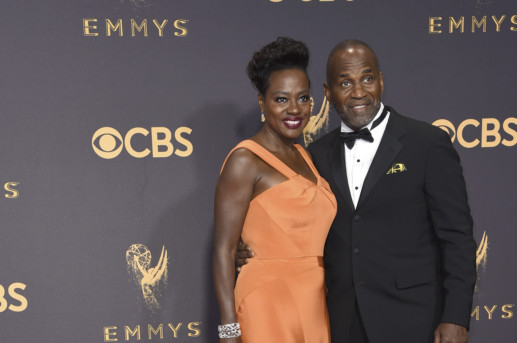
Actor Julius Tennon is thrilled to be appearing alongside his Oscar-winning wife, Viola Davis, in the new season of her hit show, How to Get Away with Murder, later this month. It is rare they work together on-screen.
Off-screen, however, the power couple spend much of their time working together for they have a joint mission: to change the face of Hollywood by increasing diversity across the industry.
A recent study showed that despite the huge success of recent films such as Fences, starring Davis and Denzel Washington; Moonlight; and Hidden Figures, Hollywood remained as white and male dominated as ever. Representation of race, gender, LGBT people and disability had barely changed in the past 10 years, according to the research by academics at the University of Southern California (USC).
Tennon said: “That study was important because it’s highlighting what the state of Hollywood really is.”
He added: “Obviously there are pipeline issues at the top with people of colour.”
Some networks were doing a good job, he said, but “slow she goes. It’s a brick by brick situation.
“When I go to meetings, it’s generally not African Americans that I’m talking to about getting something greenlit. Folks at the top are going to have to make decisions about trying to make systemic change. That’s the only way it’s going to happen — by creating a pipeline of opportunities for folk to get in there, go through it and get out and start being a part of it at the top.”
He and Davis, who married 14 years ago and have a seven-year-old daughter, Genesis, set up their multimedia company, JuVee Productions, in 2011 to tackle the problem from the grass roots. They wanted to create more suitable roles for Davis’s talent.
Tennon, 63, said: “We started it out of a need for her career, for Viola to be more than this woman who turns a piece of baloney into a fillet mignon. She was getting one or two scenes in a movie and some guest star TV work, but after Antwone Fisher [a 2002 film starring and directed by Denzel Washington], there were a lot of eyes on her.”
They quickly decided to expand their goal and try to create opportunities for a diverse range of people on and off the screen.
“While we had this elevation in the industry, we felt it was a chance to give opportunities to others, whether that be actors or below-the-line people,” Tennon said. “We consider ourselves the voice of the voiceless.”
The USC study looked at the 100 top grossing films at the US box office in 2016. It found that 5.8 per cent of directors were black and 3.3 per cent Asian. Just 4.2 per cent of directors, 20.7 per cent of producers, 13.2 per cent of writers and 1.7 per cent of composers were female; while only 31 per cent of the speaking roles went to women. LGBT characters filled 1.1 per cent of all speaking parts and people with disabilities 2.7 per cent.
No black women appeared in 47 of the films and there were no black female directors.
Viola Davis said via email: “The reason diversity is still an issue is that everyone is not ‘put to task’.”
She said it was a much bigger issue than casting and stories, agreeing with Tennon that it was a “pipeline problem”.
“If a writer, director, cinematographer, actor of colour is out there, they have the talent but haven’t had the opportunities. So, when the studios start putting together their movies, they go for who they know, who they’ve worked with ... the hottest, buzziest, the one with the resume... and most of them are white.”
She added: “No one says anything, because why would you? To change is to risk losing money, changing your vision, being exposed. It’s a problem that needs to be tackled from the studio heads who give the green light vote to film-makers who simply can envision a role differently, to producers who can give a budding gifted cinematographer, grip, writer of colour a chance, and finally to audiences to plop down money to see a film character differently. It requires being awoke.”
These days, Tennon, who has appeared in more than 50 films and TV series, concentrates mostly on running JuVee and producing. The company takes on everything from virtual reality and digital content to television and film.
Their first film, Lila & Eve, with Davis and Jennifer Lopez, was released in 2015. Custody, featuring Davis, followed in 2016. Next spring, they start shooting the Personal History of Rachel Dupree, the story of an African American woman struggling to farm the Badlands in South Dakota in 1917. A biopic of Barbara Jordan, the first southern black woman to be elected to the House of Representatives, is in the development stage. Both will star 52-year-old Davis.
They are also working on the movie adaptation of Rachel Lloyd’s critically acclaimed book Girls Like Us, a true story about sex trafficking.
Tennon said Davis, who won an Oscar for Fences this year and was nominated for Oscars in 2012 for The Help and 2009 for Doubt, “touches people across the globe”. He added: “We’re using the platform to push things forward.”
The first three seasons of How to Get Away with Murder are on Netflix. “It’s exploded her star. She’s sitting in all these different living rooms where a black woman wasn’t sitting, and it’s powerful. As a company, we feel like we have to make sure that the content going out is above and beyond. When we create narratives, we want them to be whole and full and rich, and non-stereotypical.”
He continued: “We’re in a market now that’s accelerated by technology. Diversity is what we’re bringing to the digital space. We want content for everyone and content that people of colour will consume.”
Mentioning the global success of Moonlight, Hidden Figures and Fences, he said: “We’re in a space now where diversity is good business and people should see it like that.”
Organisations should be hiring people of colour in executive positions, he believes, and thinking how to “include these people to help shape things so they have a complete slate, that has a little bit of everything”. “Those organisations that are thinking that way, big and expansive, will be the winners,” he said.
Tennon’s first public performance was at 14, when he performed the I Have a Dream speech by Martin Luther King Jr in a school assembly. Encouraged by his English teacher, who thought he had a beautiful voice, he became the first African American in the drama department at the University of Tulsa — which he attended on an American football scholarship — and went on to pursue his dream of becoming an actor.
Now he, along with the woman he describes as “one of a handful of great actresses of our time”, hopes to give others the chance to achieve their dreams, too.













